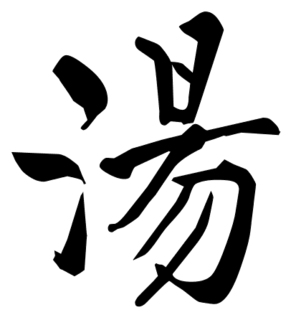
Wú is the pinyin transliteration of the Chinese surname 吳, which is a common surname in Mainland China. Wú (吳) is the sixth name listed in the Song Dynasty classic Hundred Family Surnames. In 2019 Wu was the ninth most common surname in Mainland China. A 2013 study found that it was the 8th most common surname, shared by 26,800,000 people or 2.000% of the population, with the province having the most being Guangdong.
Fu Jian, originally named Pu Jian, courtesy name Jianye (建業), formally Emperor Jingming of (Former) Qin ( 秦景明帝), was the founding emperor of the Di-led Chinese Former Qin dynasty.
Fu Sheng, originally named Pu Sheng (蒲生), courtesy name Changsheng (長生), formally Prince Li of Yue (越厲王), was an emperor of the Di-led Former Qin dynasty of China. He was the son of Former Qin's founding emperor Fu Jiàn, and was a violent, arbitrary, and cruel ruler, and after ruling for only two years was overthrown by his cousin Fu Jiān in a coup and executed, and therefore was not posthumously recognized as an emperor during the remainder of Former Qin's rule.

Féng is a Chinese surname. It is 9th on in the Song Dynasty Hundred Family Surname poem and is reported as the 31st most common Chinese last name in 2006. Unlike the less common Feng name "phoenix" it is a rising second tone féng in modern Mandarin.

Ma is a Chinese family name. The surname literally means "horse". As of 2006, it ranks as the 14th most common Chinese surname in Mainland China and the most common surname within the Chinese Muslim community, specifically the Hui people, Dongxiang people and Salar people. In 2019 it was the 13th most common surname in Mainland China. A 2013 study found it to be the 13th most common, shared by 17,200,000 people or 1.290% of the population, with the province with the most being Henan. It is the 52nd name on the Hundred Family Surnames poem.
Qiū is the Hanyu Pinyin transliteration of the Chinese family names 丘/邱, and 秋. They may be transliterated in various forms, as:

Qian, also spelt Chin, Chien, Tsien, or Zee in Wu Chinese, is a common Chinese family name. The name literally means "money". Qian is listed at the second place in the Song Dynasty text Hundred Family Surnames, in the line 趙錢孫李. As the royal surname of the kingdom of Wuyue, Qian was regarded as second only to Zhao, the imperial surname of the Song. As of 2008, Qian is the 96th most common surname in China, shared by 2.2 million people, with the province with the most people sharing the name being Jiangsu, an area formerly within the Wuyue kingdom.
Hong is the pinyin romanization of the Chinese surname 洪 (Hóng). It was listed 184th among the Song-era Hundred Family Surnames. Today it is not among the 100 most common surnames in mainland China but it was the 15th-most-common surname in Taiwan in 2005. As counted by a Chinese census, Taiwan is the area with the largest number of people with the name. It is also the pinyin romanization of a number of less-common names including Hóng, Hóng, and Hóng. All of those names are romanized as Hung in Wade-Giles.
Nie is a Chinese surname. It is the 126th surname in the Hundred Family Surnames. It is spelled Nip in Cantonese and Nieh in Wade–Giles.
Xin is the romanization of several Chinese surnames including Xīn 辛, Xīn 新 and Xìn 信, etc. Xīn 辛 is the most common one among these names, it is 379th surname in Hundred Family Surnames.

Dàndàn yōuqíng is a 1983 Mandarin Chinese album by Teresa Teng, first distributed by Polydor Records, Ltd., from Hong Kong and Kolin Records (歌林) from Taiwan. It contains twelve songs, which use poems from the Tang and Song Dynasties as lyrics.

Tāng is a Chinese surname. It is 72nd surname in the Hundred Family Surnames or Baijiaxing of the Song Dynasty and 101st in modern popularity. The Tang (湯) family name comes from various people of the Shang Dynasty and some nomadic Chinese people. In modern times the character can also mean "soup" or "broth".

Cen is the Mandarin pinyin romanization of the Chinese surname written 岑 in Chinese character. It is romanized Ts'en in Wade–Giles, and variously as Sam, Sum, Sham, Shum in Cantonese, Gim, Khim, Chim in Taiwanese Hokkien and Chen in other pinyin forms. Cen is listed 67th in the Song dynasty classic text Hundred Family Surnames. As of 2008, it is the 235th most common surname in China, shared by 340,000 people. Cen is considered a rare surname. A person with a rare surname like Cen may be able to trace his or her origins to a single ancestral area.

Ai is the Mandarin pinyin and Wade–Giles romanization of the Chinese surname written 艾 in Chinese character. It is listed 334th in the Song dynasty classic text Hundred Family Surnames. As of 2008, it is the 215th most common surname in China, shared by 400,000 people.

Geng is the Mandarin pinyin romanization of the Chinese surname written 耿 in Chinese character. It is romanized as Keng in Wade–Giles. Geng is listed 350th in the Song dynasty classic text Hundred Family Surnames. As of 2008, it is the 139th most common surname in China, shared by 990,000 people.

Xu is a Chinese surname. It is different from Xu, represented by a different character.

Xu is a Chinese surname. It is different from Xu, which is represented by a different character.
Pu is the Pinyin transcription of a number of distinct Chinese surnames, including:
Jiǎn, is a Han surname meaning "simple". It was the 382th surname listed on the Hundred Family Surnames. There are more people in Taiwan with this surname than any single province in Mainland China.
Pingchang or Ping Chang may refer to:









